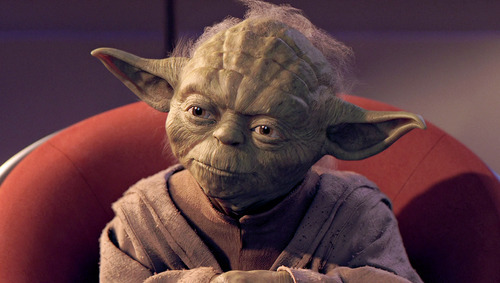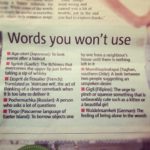A comma splice walks into a bar, it has a drink and then leaves.
A question mark walks into a bar?
Two quotation marks “Walk into” a bar.
A gerund and an infinitive walk into a bar, drinking to drink.
The bar was walked into by a passive voice.
Three intransitive verbs walk into a bar. They sit. They drink. They leave.
The 100 Most Beautiful Words in English
The 100 Most Beautiful Words in English
Ailurophile A cat-lover.
Assemblage A gathering.
Becoming Attractive.
Beleaguer To exhaust with attacks.
Brood To think alone.
Bucolic In a lovely rural setting.
Bungalow A small, cozy cottage.
Chatoyant Like a cat’s eye.
Comely Attractive.
Conflate To blend together.
Cynosure A focal point of admiration.
Dalliance A brief love affair.
Demesne Dominion, territory.
Demure Shy and reserved.
Denouement The resolution of a mystery.
Desuetude Disuse.
Desultory Slow, sluggish.
Diaphanous Filmy.
Dissemble Deceive.
Dulcet Sweet, sugary.
Ebullience Bubbling enthusiasm.
Effervescent Bubbly.
Efflorescence Flowering, blooming.
Elision Dropping a sound or syllable in a word.
Elixir A good potion.
Eloquence Beauty and persuasion in speech.
Embrocation Rubbing on a lotion.
Emollient A softener.
Ephemeral Short-lived.
Epiphany A sudden revelation.
Erstwhile At one time, for a time.
Ethereal Gaseous, invisible but detectable.
Evanescent Vanishing quickly, lasting a very short time.
Evocative Suggestive.
Fetching Pretty.
Felicity Pleasantness.
Forbearance Withholding response to provocation.
Fugacious Fleeting.
Furtive Shifty, sneaky.
Gambol To skip or leap about joyfully.
Glamour Beauty.
Gossamer The finest piece of thread, a spider’s silk.
Halcyon Happy, sunny, care-free.
Harbinger Messenger with news of the future.
Imbrication Overlapping and forming a regular pattern.
Imbroglio An altercation or complicated situation.
Imbue To infuse, instill.
Incipient Beginning, in an early stage.
Ineffable Unutterable, inexpressible.
Ingénue A naïve young woman.
Inglenook A cozy nook by the hearth.
Insouciance Blithe nonchalance.
Inure To become jaded.
Labyrinthine Twisting and turning.
Lagniappe A special kind of gift.
Lagoon A small gulf or inlet.
Languor Listlessness, inactivity.
Lassitude Weariness, listlessness.
Leisure Free time.
Lilt To move musically or lively.
Lissome Slender and graceful.
Lithe Slender and flexible.
Love Deep affection.
Mellifluous Sweet sounding.
Moiety One of two equal parts.
Mondegreen A slip of the ear.
Murmurous Murmuring.
Nemesis An unconquerable archenemy.
Offing The sea between the horizon and the offshore.
Onomatopoeia A word that sounds like its meaning.
Opulent Lush, luxuriant.
Palimpsest A manuscript written over earlier ones.
Panacea A solution for all problems
Panoply A complete set.
Pastiche An art work combining materials from various sources.
Penumbra A half-shadow.
Petrichor The smell of earth after rain.
Plethora A large quantity.
Propinquity An inclination.
Pyrrhic Successful with heavy losses.
Quintessential Most essential.
Ratatouille A spicy French stew.
Ravel To knit or unknit.
Redolent Fragrant.
Riparian By the bank of a stream.
Ripple A very small wave.
Scintilla A spark or very small thing.
Sempiternal Eternal.
Seraglio Rich, luxurious oriental palace or harem.
Serendipity Finding something nice while looking for something else.
Summery Light, delicate or warm and sunny.
Sumptuous Lush, luxurious.
Surreptitious Secretive, sneaky.
Susquehanna A river in Pennsylvania.
Susurrous Whispering, hissing.
Talisman A good luck charm.
Tintinnabulation Tinkling.
Umbrella Protection from sun or rain.
Untoward Unseemly, inappropriate.
Vestigial In trace amounts.
Wafture Waving.
Wherewithal The means.
Woebegone Sorrowful, downcast.(via so much to tell you)
Let’s face it – English is a crazy language. There is no egg in eggplant nor ham in hamburger; neither apple nor pine in pineapple. English muffins weren’t invented in England or French fries in France. Sweetmeats are candies while sweetbreads, which aren’t sweet, are meat. We take English for granted. But if we explore its paradoxes, we find that quicksand can work slowly, boxing rings are square and a guinea pig is neither from Guinea nor is it a pig.
And why is it that writers write but fingers don’t fing, grocers don’t groce and hammers don’t ham? If the plural of tooth is teeth, why isn’t the plural of booth beeth? One goose, 2 geese. So one moose, 2 meese? One index, 2 indices? Doesn’t it seem crazy that you can make amends but not one amend? If you have a bunch of odds and ends and get rid of all but one of them, what do you call it?
If teachers taught, why didn’t preachers praught? If a vegetarian eats vegetables, what does a humanitarian eat? In what language do people recite at a play and play at a recital? Ship by truck and send cargo by ship? Have noses that run and feet that smell? How can a slim chance and a fat chance be the same, while a wise man and a wise guy are opposites?
You have to marvel at the unique lunacy of a language in which your house can burn up as it burns down, in which you fill in a form by filling it out and in which an alarm goes off by going on. English was invented by people, not computers, and it reflects the creativity of the human race (which, of course, isn’t a race at all). That is why, when the stars are out, they are visible, but when the lights are out, they are invisible.
albicant: whitish; becoming white
amaranthine: immortal; undying; deep purple-red colour
aubergine: eggplant; a dark purple colour
azure: light or sky blue; the heraldic colour blue
celadon: pale green; pale green glazed pottery
cerulean: sky-blue; dark blue; sea-green
chartreuse: yellow-green colour
cinnabar: red crystalline mercuric sulfide pigment; deep red or scarlet colour
citrine: dark greenish-yellow
eburnean: of or like ivory; ivory-coloured
erythraean: reddish colour
flavescent: yellowish or turning yellow
greige: of a grey-beige colour
haematic: blood coloured
heliotrope: purplish hue; purplish-flowered plant; ancient sundial; signalling mirror
hoary: pale silver-grey colour; grey with age
isabelline: greyish yellow
jacinthe: orange colour
kermes: brilliant red colour; a red dye derived from insects
lovat: grey-green; blue-green
madder: red dye made from brazil wood; a reddish or red-orange colour
mauve: light bluish purple
mazarine: rich blue or reddish-blue colour
russet: reddish brown
sable: black; dark; of a black colour in heraldry
saffron: orange-yellow
sarcoline: flesh-coloured
smaragdine: emerald green
tilleul: pale yellowish-green
titian: red-gold, reddish brown
vermilion: bright red
violescent: tending toward violent
virid: green
viridian: chrome green
xanthic: yellow
zinnober: chrome green
“ten letters” is ten letters, and this is ten words
“will will smith smith?” is a grammatically correct sentence
so is “Will Smith will smith.”
“Smith Will Smith will.”
I also just realized this could be a conversation.
Will Will Smith smith?
Will Smith Will Smith
*Yoda nods in agreement* Smith Will Smith will.
imagine someone who isnt that good at english reading this and just thinking “what is wrong with these people”
the-puzzle-that-put-you-to-tears:
I before E
except when you run a feisty heist on a weird beige foreign neighbour
“English doesn’t borrow from other languages. English follows other languages down dark alleys, knocks them over and goes through their pockets for loose grammar.”
― James NicollThe rule is actually I before E except after C when making the sound EE. There are still exceptions, of course, but there are way less.


